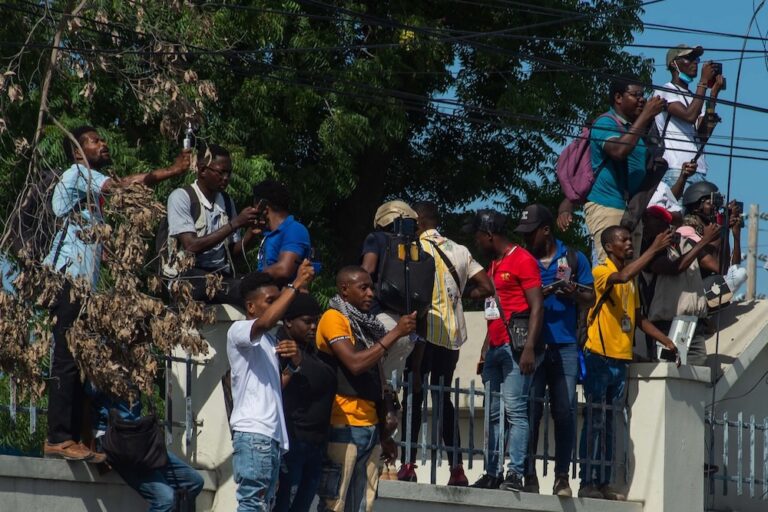(RSF/IFEX) – RSF has voiced deep concern about the situation in Haiti after Spanish television journalist Ricardo Ortega was killed and American news photographer Michael Laughlin was injured in Port-au-Prince shootings on 7 March 2004. “We express our condolences to Ricardo Ortega’s family and we reiterate our appeal to all the parties on the ground […]
(RSF/IFEX) – RSF has voiced deep concern about the situation in Haiti after Spanish television journalist Ricardo Ortega was killed and American news photographer Michael Laughlin was injured in Port-au-Prince shootings on 7 March 2004.
“We express our condolences to Ricardo Ortega’s family and we reiterate our appeal to all the parties on the ground not to target the press,” RSF Secretary-General Robert Ménard said. “Unfortunately, the safety of journalists in Haiti will not be guaranteed as long as armed militias are free to operate without any control by a recognised central authority,” the organisation added, while calling for an investigation into the origin of the gunshots in order to identify and punish those responsible.
A visiting correspondent for the Spanish television station Antena 3, Ortega was fatally shot while covering a demonstration by opponents of former President Jean-Bertrand Aristide. Enrique Ibañez, of the Spanish news agency EFE, said shooting broke out as demonstrators were dispersing. At least six people were killed and about 30 were injured. Witnesses said the shots were fired by pro-Aristide gunmen known as chimères. The demonstrators had been calling for Aristide followers to be brought to trial.
Ortega did not die at the scene. After being shot, he took refuge in a nearby house with Laughlin, a photographer with the South Florida (United States) daily “Sun-Sentinel”, who had also just been injured by gunshots. Laughlin said Ortega continued to film footage with his video camera after being shot.
The two journalists were taken to the Canapé Vert hospital in Port-au-Prince, where Ortega died from his bullet injuries, one to the chest and another to the abdomen. Laughlin, who was hit in the shoulder and face, was to be evacuated to a Florida hospital, “Sun-Sentinel” spokesperson Kevin Courtney told Reuters.
The Associated Press (AP) said international peacekeepers were unable to say where the gunshots originated. American and French peacekeepers had accompanied the marchers until they reached Champs de Mars Square, opposite the presidential palace. Agence France-Presse (AFP) said the peacekeepers’ presence did not prevent the outbreak of gunfire as marchers dispersed. AP said no arrests were made.
Ortega, aged 37, began his press career as an EFE correspondent in Moscow. He then freelanced for Antena 3 television before joining the station’s staff in 1994. He covered the war in Chechnya and the 11 September 2001 attacks in New York, where he was a resident correspondent at the time. He also covered the wars in Afghanistan and Iraq. Although on vacation, he volunteered to cover the crisis in Haiti. The Spanish embassy in Port-au-Prince took custody of his body pending repatriation to Spain on 8 March.
Several foreign journalists have been targeted by Aristide supporters in recent weeks. An AFP photographer was reportedly wounded on 20 February while covering a peaceful student demonstration in Port-au-Prince. According to the AP, Roberto Andrade of the Mexican television station Televisa and two other journalists from the Mexican television network TV Azteca were also the target of stone-throwers at the same demonstration (see IFEX alert of 24 February 2004). They tried to flee but were caught by Aristide supporters and were forced to surrender their video cassettes.
On 24 February, reporter Michel Jean and cameraman Sylvain Richard of the Radio Canada television network were also the target of gunfire by pro-Aristide chimères in northern Port-au-Prince (see alert of 3 March 2004).
Previously, only Haitian journalists critical of the government had been the victims of violence. Two of them were killed. Jean Dominique was killed in April 2000 (see alerts of 2 September, 4 April, 26 and 19 March 2003 and others) and Brignol Lindor in December 2001 (see alerts of 2 September 2003, 5 December, 25 and 16 September, 2 April and 15 January 2002 and others). Several dozen journalists have been threatened or physically attacked by pro-Aristide chimères in recent years. Some 30 journalists have fled into exile since 2000.


